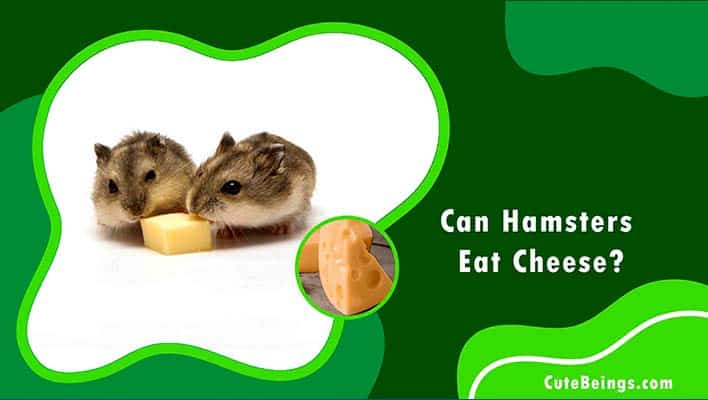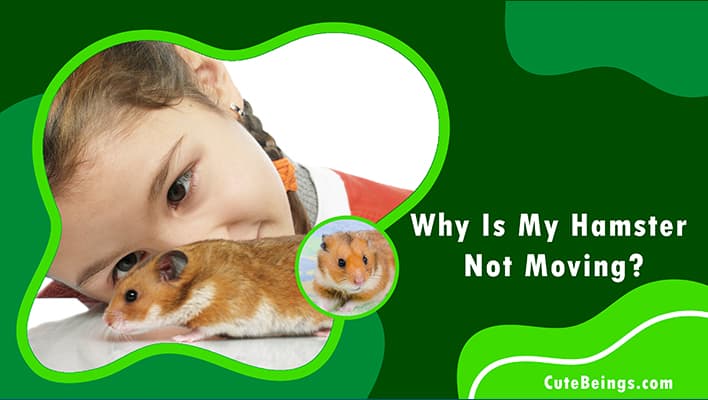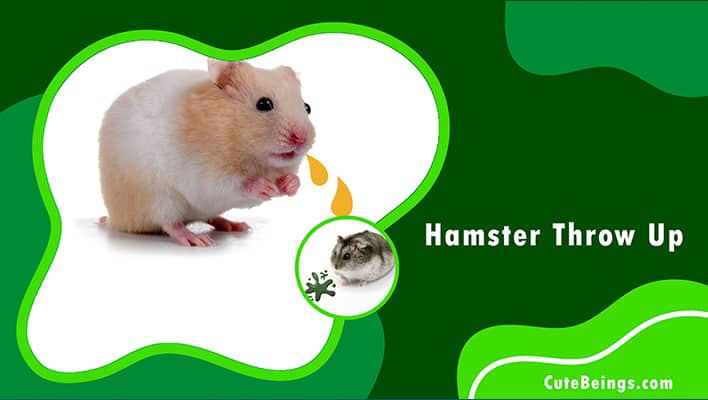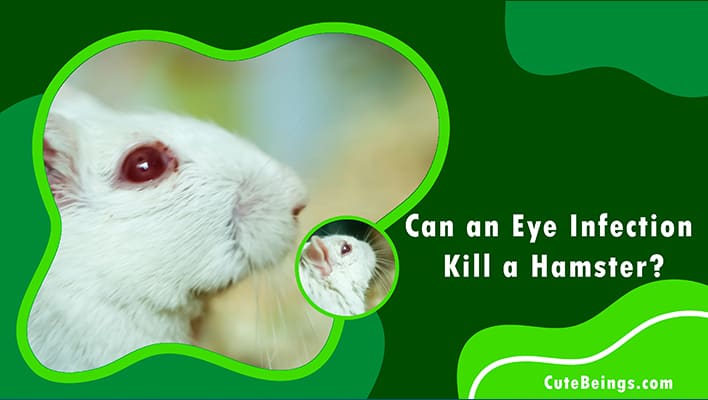Can hamsters eat cheese? Well, most people don’t have a proper idea about it. But the truth is hamsters do like to eat cheese and it’s safe for hamsters to eat cheese. You don’t need to worry about the hamster cheese type when you serve and there is nothing that makes cheese toxic for your hamster.
Wild hamsters do not have access to cheese unfortunately but they have good food sources such as seeds, fruit and insects to get a higher level of protein and fats for a balanced diet. So for domestic hamsters it’s just an introduced food craving as they are not born with it. Humans are also the same as it’s just a personal food preference.
For hamster’s diet, cheese is a good addition as cheese can offer several nutritional benefits and of course your hamster will love the taste. Though it’s a good food addition and it offers nutrition, cheese is not an essential food item for hamster diet. Hamsters can still have a balanced diet even without cheese.

Table of Contents
Lactose Intolerance
Even your hamster loves cheese, its body may not welcome it and it’s pretty normal. In nature hamster’s digestive system is made for vegetable, fruit and occasionally hamsters eat insects. But cheese is a man made dairy item. So it’s quite understandable if your hamster is having an upset stomach or digestive issues after having cheese.
A component named lactose is the reason behind this. Lactose needs the interference of an enzyme called lactase to digest in the stomach. But you understand that the bodies are quite different to each other and they do not produce this enzyme in the same amount or the same way.
That makes the reason for some animals which can’t digest it properly and to have digestive problems after consuming dairy products. So such animals can be considered as lactose intolerant.
So it’s very important that you observe your hamster after offering cheese. When introducing cheese as hamster treats, do it in a progressive way. If you observe your hamster throw up or has diarrhea you can avoid serving cheese in the future. If you find out that your pet hamster is lactose intolerant, do not worry because still you can offer other tasty treats to your pet.
Nutritional Value Of Cheese
-
Protein: Cheese is a great option for you to provide some protein for your hamster. Usually around 15% to 20% of hamster’s diet should contain protein. For pregnant hamsters, this amount is higher as 24%. When you serve food for your hamster make sure you fulfill this requirement and cheese can help you with this dietary requirement.
-
Minerals: In cheese you can find several minerals such as calcium, magnesium and phosphorus and these all are very important for hamster’s well being.
-
Calcium: Cheese is a good source of calcium and calcium plays a vital role in maintaining proper bone health.
-
Vitamins: Vitamins can give energy to hamsters and maintain a good immune system. Vitamins also support healthy bones, foundation of blood clotting within the body and healthy eye sight.
Vitamin A: helps to maintain a good immune system and fights against illness.
Vitamin B: gives your hamster energy and protects immune system.
Vitamin A, B12, D and K: helps with healthy eye sight, healthy bones and foundation of blood clotting within the body.
-
Zinc: helps to improve the hamster’s metabolism, and maintain a good digestive system.
Risks Associated With Cheese
If you offer the correct amount of cheese, that could benefit your hamster in many ways. But if you overfeed cheese to your hamster, that could lead to some serious risks.
-
Too much cheese could lead to obesity as cheese contains higher fat and calories content.
-
Higher fat content could lead to diabetes.
-
Saturated fat could increase the blood cholesterol levels and it can increase the risks of health conditions such as stroke or heart failure.
-
Saturated fat and cholesterol in cheese could cause constipation.
-
Sodium could spike the blood pressure and could raise the risk of kidney disease.
-
Salty cheese could lead to dehydration so choose low salt cheeses.
-
As cheese is low in fiber, too much cheese will have an impact on your pet’s bowel movements.
-
Blue cheese such as silton can be toxic and could be fatal to your hamster.
-
Large pieces can cause choking to your hamster.
Cheese Types You Can Offer To Your Hamster
Cheese is not an essential component of hamster’s diet and when it comes feeding cheese there are some cheese varieties that are preferable than others. You all are aware that there are many cheese types and the type of cheese that these furry animals can consume depends on the breed.
If you are willing to offer cheese to your hamster, you can try the following mentioned soft cheese types
-
Unflavored cottage cheese (mainly low fat cheese with no additives)
When you are selecting a cheese type cottage cheese should be your first selection. This type doesn’t contain many calories as other types of cheese and it contains good amount of calcium and protein. There is no added sugar and there is a little bit unsaturated fat in it. Cottage cheese is very good for pregnant and nursing rodents and also it can benefit to young hamsters who are under 6 months of age.
This cheese presents light flavor, sweet and pleasing quality. It is soft in nature and you can easily cut into small pieces. It doesn’t contain much fat so it won’t cause issues to hamster’s health.
This type is soft and low in fat. You can serve a ricotta cheese piece with a small berry to make it a special treat for your pet.
Provolone cheese is mainly sold in slices so you can easily peel off tiny pieces and serve them to your pet. This has a little bit of flavor and it could be fun for your hamster.
Avoid These Cheese Types
Some cheeses are fine with hamsters while there are some cheeses which could cause health issues to your pet. Avoid feeding following cheeses so your hamster won’t have to face any serious issues.
-
Moldy or aged cheese: be careful about the strength of cheese as it could cause digestive issues.
-
Very soft cheese: if the cheese is so soft, your hamster will find it hard to consume it and it might even stick to its feet.
-
Fatty cheese: this would result in obesity and diabetes and further it would cause serious health issues.
-
Blue cheese: the bacteria which are in blue cheese could cause health issues to your hamster.
Consider These Before Offering Cheese
Quantity Of Salt
Cheese varieties such as mature cheddar cheese, asiago, parmesan and processed cheese contain higher levels of sodium and it would be better if you can avoid them. Too much salt is dangerous to your hamster so as a responsible hamster owner always choose low salt cheeses to feed your pet.
Fat
You can feed mild cheese to your hamster. Make sure to choose a low fat cheese otherwise your furry pet will be suffering from obesity and other health issues.
How To Serve Cheese To Your Hamster
-
First place the cheese block on a plate.
-
Then cut into small pieces using a knife.
When you cut cheese into small pieces, make sure that the pieces are small enough for your hamster to eat comfortably. Large pieces could cause choking so be aware about the size of pieces.
You can offer a small amount at first and observe whether you hamster like it. If you notice that your pet neglects cheese remove it from the cage. You can try again after few days.
After you serve cheese make sure that your hamster doesn’t stash cheese in its cheek poach. Usually hamsters put food in their cheek poaches and it could lead hamster’s teeth to rot and this could cause serious dental issues to hamsters.
Frequently Asked Questions (FAQs)
How To Choose And Store Cheese?
When choosing cheese in store make sure the cheese is in good condition and has more days to expire. As soon as you return to home keep the cheese in refrigerator and keep it fresh.
Now you can buy cheese in resealable packages and those can keep cheese fresh. If you are buying cheese without these resealable packages follow these methods to keep it fresh for you and your hamster.
-
Soft cheese: you can place them in resealable plastic container and keep it in refrigerator.
-
Hard cheese: use cling film to wrap it after use.
-
Fresh cheese which is packed in water such as mozzarella: always keep the cheese in the original pack and just change the water once in every few days.
How Much Cheese Should You Give Your Hamster?
When feeding cheese to your hamster, the amount should be very small and limit to the size of pea. You can serve 1 or 2 pea size pieces of cheese at first time. When you are introducing cheese for the first time you need to offer very little amount and if your hamster doesn’t show any signs of illness you can gradually increase the amount you serve.
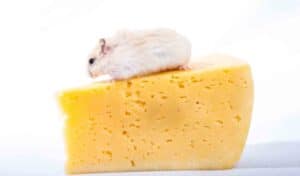
This is not a treat you can offer every day due to the high amount of lipids in cheese. You can offer this as a special treat once or twice a week. This will prevent obesity and other health issues.
Always keep in mind that too much cheese can cause upset stomach, gas, diarrhea or bloating to your pet.
When serving cheese you should only give them for one serve otherwise hamsters would try to keep it stored to consume later. They will keep the excess in the corners of cage and sometimes they may even bury it. That cheese could attract bacteria, fungus and insects easily. Also rotten food can cause serious health issues to your hamster.
If your hamster doesn’t eat much or drink enough water after having cheese seek medical advice to prevent any sickness.
Most importantly the amount of cheese that a hamster can consume depends on their breed.
How Much Cheese Should You Give A Syrian Hamster?
You can offer 3 tiny cubes of cheese to your Syrian hamster in every two weeks. The size of a cube should be equal to the size of cheese pieces you get on sticks at a party.
How Much Cheese Should You Give A Robo Hamster?
Robo hamsters would love to eat cheese but you need make certain that you don’t offer too much cheese to your pet. You can offer 2 tiny cubes every fortnight.
How much cheese should you give a dwarf hamster?
Winter white dwarf hamster, Campbell dwarf hamster and Chinese hamster can only consume one tiny cube every two weeks. This is mainly due to their size and again offering too much cheese can cause serious health conditions to your pets.
Can Hamsters Eat Cheese Puffs Or Cheese Balls?
No, hamsters can’t consume cheese balls or cheese puffs. These snacks don’t contain any cheese in it at all.
These cheese flavored snacks doesn’t do any good health wise to your hamster and contain higher levels of sodium. You already know that higher levels of sodium can spike the blood pressure in hamsters and could leave them in critical conditions such as having a heart attack or stroke. It also affects the kidneys as well.
Can Hamsters Eat Cheesy Snacks?
No, though hamsters can consume cheese, they are not able to eat cheese snacks such as cheese puffs or cheese balls.
Never feed your hamster the cheesy snacks which are made for humans or simply human food. These products include cheese strings, mini cheddars and other cheese flavored snacks as they all contain high sodium levels. Check the packaging before you buy and the products that are made for pets could be safe.
Can Hamsters Eat Cheese Chews?
Yes hamsters can eat cheese chews. You purchase this sweet treat in your local pet store or on Amazon. They can satisfy the need to chew and help to maintain healthy teeth.
Cheese chews are made with seeds, nuts, veggies using cheese flavor. These chews are a healthy and tasty treat for hamsters.
Can Cheese Kill A Hamster?
Some cheese could include salt, spices and butter in it. These ingredients can harm badly or sometimes even kill you loving pet. As humans it’s not good to have too much fat or carbs and the same thing applies for hamsters when consuming hamster food or hamster pellets.

Hello, my name is James and I’ve been caring for tiny pets for over 14 years with a passion. I enjoy passing on my expertise to other individuals in order for them to have the same amount of enjoyment as I do.

